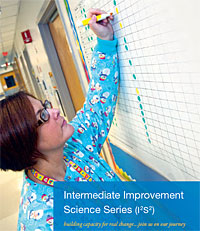Intermediate Improvement Science Series (I²S²)
At Cincinnati Children’s, the James M. Anderson Center for Health Systems Excellence is transforming the delivery of care through improvement science. Our Intermediate Improvement Science Series (I²S²) is an accredited course that transforms how participants view their roles, their work, and the hospital system they serve as they learn and apply proven quality improvement tools, processes, and knowledge to produce excellent and equitable outcomes for all patients.
We welcome leaders from other healthcare systems outside of Cincinnati Children’s to apply for the program.
Why Join Us?
- This course helps accelerate the transformation of health and healthcare delivery as you learn key change management skills to improve outcomes for your patients and your community now and into the future
- You will be supported by a personal QI (Quality Improvement) coach in translating classroom learning into action for an improvement opportunity in your healthcare setting
- Make a direct impact in areas such as safety, productivity, clinical outcomes, patient-family experience, cost / business process and community health
- Learn from and network with peers and faculty at Cincinnati Children's, a recognized leader in improving child health. We have graduated over 1,000 leaders from I2S2, with 89% having achieved measurable improvement by course end
How We Guide Improvement
I²S² helps build a broader and deeper network of improvement leaders, accelerates cultural transformation and develops QI leadership skills and experience using the Model for Improvement and Deming’s “System of Profound Knowledge.” Participants work on an identified project in their system to drive meaningful improvements in care as they build their skills.
As a result of participating in I2S2 attendees will be able to:
- Successfully apply Deming’s System of Profound Knowledge and Cincinnati Children’s Improvement Science Model to an improvement opportunity related to their role, work, or hospital system
- Lead a team to generate meaningful change on a specific project by utilizing quality improvement tools to plan their project, understand the current state, develop goals, design tests of change, implement changes, and leverage what they learned to sustain those improvements
- Collect data and utilize it to measure and demonstrate effect of tests of change on the desired outcome
- Identify opportunities to increase the level of care every patient receives regardless of race, ethnicity, gender, sexual orientation, zip code or socioeconomic status




